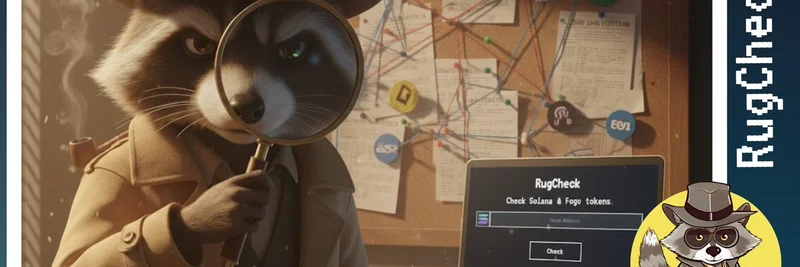In the wild world of meme tokens, where fortunes can flip faster than a viral cat video, staying safe is key. That's where tools like RugCheck come in, acting as the community's watchdog against sneaky scams. Recently, the team behind RugCheck dropped a tweet that's got everyone talking about how scammers don't just vanish—they reinvent themselves.
The tweet from Rugcheckxyz puts it plainly: "Scams don’t disappear; they rebrand. Same wallets. Same deployers. Different token names. RugCheck keeps track of them all." For those new to the scene, a "rug pull" is when token creators hype up a project, attract investors, and then suddenly pull out all the liquidity, leaving holders with worthless coins. It's like building a sandcastle and then kicking it over just as people start admiring it.
Accompanying the tweet is a slick graphic titled "RugCheck Vol III," dated October 9, 2025. It features a detective raccoon—fitting for a tool that's all about sleuthing—peering through a magnifying glass at a conspiracy board littered with connected tokens like $GME and $EOI. There's even a laptop screen showing the RugCheck interface for checking Solana and other tokens. This visual drives home the point: scammers are recycling their tactics, but RugCheck is mapping it all out.
RugCheck, known as Solana's go-to anti-rug tool, now supports token extensions, making it even more robust for spotting red flags. By tracking wallets and deployers across multiple projects, it helps users avoid falling into the same trap twice. In the meme token space, where projects pop up overnight on platforms like Pump.fun, this kind of vigilance is crucial. Meme tokens thrive on hype and community, but without proper checks, they can turn into nightmares.
The thread also sparked a response from the $BHSL team (BuyHighSellLow), who challenged a specific label on their token. They argued that an earlier project, Allin, wasn't a true rug since no external buyers were involved—the dev just moved their own tokens. "Labeling projects this way without checking on-chain data is misleading and harmful," they said, calling for more transparency from RugCheck.
This back-and-forth highlights the delicate balance in the crypto world: protecting users while ensuring accusations are fair. For meme token enthusiasts, it's a reminder to always DYOR (do your own research) and use tools like RugCheck before diving in. Whether you're chasing the next big moonshot or just dipping your toes, staying informed about these rebranding tactics can save you from a painful rug.
If you're building or investing in meme tokens on Solana, head over to rugcheck.xyz to run your own checks. Knowledge is power in this game, and with resources like this, the community gets stronger every day.


